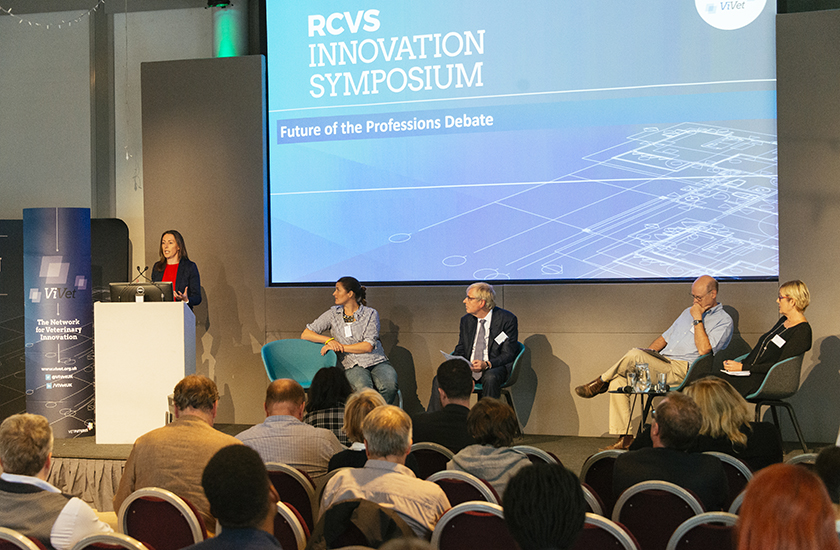Second ViVet Symposium explores future of veterinary medicine
11 October 2019
Last week we held our biennial ViVet Innovation Symposium, bringing together veterinary professionals and stakeholders from diverse backgrounds to discuss the evolving role of the veterinary professional and the advancements in both companion and production animal care in the UK and across the world.
 The symposium, held on Tuesday 1 October at the Lowry in Manchester, focused on precision veterinary medicine. It looked at how the growth of data driven practice and rapidly developing technology such as real-time low-cost genomics, artificial intelligence and big data will affect the veterinary professions, how their role might change and the opportunities available.
The symposium, held on Tuesday 1 October at the Lowry in Manchester, focused on precision veterinary medicine. It looked at how the growth of data driven practice and rapidly developing technology such as real-time low-cost genomics, artificial intelligence and big data will affect the veterinary professions, how their role might change and the opportunities available.
Featuring a wide range of inspirational speakers, the day explored the potential of emerging technology to improve the lives of veterinary professionals and the services they provide. The keynote speaker, Nancy Rademaker, opened the day’s presentations with a thought-provoking talk on how technology has changed customer behaviour and how the profession must adapt to the ‘new normal’ in order to thrive. Nancy highlighted that the customer is looking for transparency, personalisation, convenience and speed and the challenges this presents for every sector.
The day covered three broad themes, the first of which honed in on how technology such as big data and artificial intelligence (AI) will fundamentally change the role of the veterinary professional. With medical knowledge expanding exponentially, many of the presentations touched on the increasing importance of veterinary professionals using tools such AI to augment their intelligence and harnessing data insights. With so much data available to us, it is now about knowing what to do with it and how to transform insights into innovative action.
The second theme that was covered throughout the day was the complex interaction between innovation and regulation. Innovation is the mechanism through which products and services improve, but it carries a degree of risk as it involves novel and potentially untested products, services and ways of working - here lies the regulatory challenge.
“Daniel Berman, Lead of the Global Health Team at NESTA, spoke about how ‘anticipatory regulation’, quickly becoming recognised as best practice, is one way to approach this regulatory challenge. This is about regulators, such as the RCVS, taking a proactive approach to innovation, engaging stakeholders about the issues it raises and seeking to create future-proof frameworks which, in rapidly changing environments, will protect the public whilst at the same time as fostering innovation,” says Anthony Roberts, our Director of Leadership and Innovation.
“This is in line with the aims of the ViVet project: to prepare the profession for the impact of innovation whilst at the same time allowing the College to reflect on the future relevance of its regulation.”
The final key theme of the day focused on changing consumer demands and the opportunities and threats that these create for the veterinary professions. In particular, it was highlighted that today customers expect a quick, convenient and personalised service.
This creates a challenge for veterinary professions, who must navigate a complex tripartite relationship of vet, client and animal. Much discussion was held, therefore, on the need to find a balance between being customer-centric and keeping the animal health and welfare at the centre of what veterinary professionals do. This nuance was the focus of the day’s ‘Future of the Professions debate’ with informed arguments presented for both side of the motion: ‘In order to thrive the veterinary professions must become truly ‘customer-centric’.
At the close of the debate the majority of delegates voted in favour for the motion, with general agreement that focusing on meeting the customers’ need and wants must be balanced with the interests of the animal.
“It was a really positive and engaging day and the symposium provoked some exciting debate and discussion as to the opportunities the future holds for the veterinary professions, the role of the veterinary professional going forward, and how we collectively can drive this forward,” says Anthony.
ViVet Symposium 2019 also held the final of the Student Veterinary Innovation Competition, which saw three finalist teams present their innovative veterinary proposals in front of a panel of industry professionals. The winning team was Christina Ratcliffe and Ana Almeida-Warren from Liverpool University with a presentation of their VetCase app concept. The concept, a case-based learning app, would include clinical examinations and diagnostic test functionality to reflect real-life situations and help students prepare for working in the veterinary industry.
The symposium was recorded on the day and videos, along with a write-up of the day, will be available soon on the ViVet website.